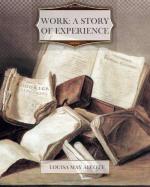She soon felt at home, and went about the old house visiting familiar nooks with the bitter, sweet satisfaction of such returns. It was sad to miss Aunt Betsey in the big kitchen, strange to see Uncle Enos sit all day in his arm-chair too helpless now to plod about the farm and carry terror to the souls of those who served him. He was still a crabbed, gruff, old man; but the narrow, hard, old heart was a little softer than it used to be; and he sometimes betrayed the longing for his kindred that the aged often feel when infirmity makes them desire tenderer props than any they can hire.
Christie saw this wish, and tried to gratify it with a dutiful affection which could not fail to win its way. Baby unconsciously lent a hand, for Uncle Enos could not long withstand the sweet enticements of this little kinswoman. He did not own the conquest in words, but was seen to cuddle his small captivator in private; allowed all sorts of liberties with his spectacles, his pockets, and bald pate; and never seemed more comfortable than when she confiscated his newspaper, and sitting on his knee read it to him in a pretty language of her own.
“She’s a good little gal; looks consid’able like you; but you warn’t never such a quiet puss as she is,” he said one day, as the child was toddling about the room with an old doll of her mother’s lately disinterred from its tomb in the garret.
“She is like her father in that. But I get quieter as I grow old, uncle,” answered Christie, who sat sewing near him.
“You be growing old, that’s a fact; but somehow it’s kind of becomin’. I never thought you’d be so much of a lady, and look so well after all you’ve ben through,” added Uncle Enos, vainly trying to discover what made Christie’s manners so agreeable in spite of her plain dress, and her face so pleasant in spite of the gray hair at her temples and the lines about her mouth.
It grew still pleasanter to see as she smiled and looked up at him with the soft yet bright expression that always made him think of her mother.
“I’m glad you don’t consider me an entire failure, uncle. You know you predicted it. But though I have gone through a good deal, I don’t regret my attempt, and when I look at Pansy I feel as if I’d made a grand success.”
“You haven’t made much money, I guess. If you don’t mind tellin’, what have you got to live on?” asked the old man, unwilling to acknowledge any life a success, if dollars and cents were left out of it.
“Only David’s pension and what I can make by my garden.”
“The old lady has to have some on’t, don’t she?” “She has a little money of her own; but I see that she and Letty have two-thirds of all I make.”
“That ain’t a fair bargain if you do all the work.” “Ah, but we don’t make bargains, sir: we work for one another and share every thing together.”
“So like women!” grumbled Uncle Enos, longing to see that “the property was fixed up square.”




